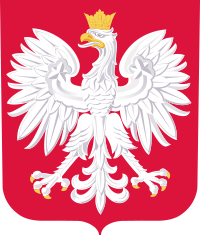Ministries of Poland
The ministries of Poland are the various departments performing functions implemented by the Polish government. Each ministry is headed by a governmental minister selected by the Prime Minister, who sits in the collective executive Council of Ministers. The current competences and regulations of the ministries were established under a series of central administrative reforms carried out by prime ministers Józef Oleksy and Włodzimierz Cimoszewicz between 1996 and 1997.[1][2] Under legal regulations, the cabinet can create, combine, or dissolve ministries, with the Prime Minister determining the scope and responsibilities of ministers. The number and range of ministries has varied throughout the past.

As of 2015, seventeen codified ministries exist within the government. The following departments discharge executive functions under the Cabinet of Ewa Kopacz.
 |
|---|
| This article is part of a series on the politics and government of Poland |
|
|
|
|
Related topics
|
Current ministries
- Ministry of Agriculture and Rural Development
- Ministry of Culture and National Heritage
- Ministry of Digital Affairs
- Ministry of Energy
- Ministry of Environment
- Ministry of Family, Labour and Social Policy
- Ministry of Finance
- Ministry of Foreign Affairs
- Ministry of Health
- Ministry of Infrastructure
- Ministry of Interior and Administration
- Ministry of Justice
- Ministry of Marine Economy and Inland Navigation
- Ministry of National Defence
- Ministry of National Education
- Ministry of Science and Higher Education
- Ministry of Sport and Tourism
- Ministry of Entrepreneurship and Technology
- Ministry of Investment and Economic Development
- Ministry of State Assets
Outside departments
- Chancellery of the Prime Minister of Poland (Kancelaria Prezesa Rady Ministrów) - the Chancellery is not considered a ministry of the government, though it retains a seat within the cabinet.
Former ministries (disbanded or merged)
- Ministry of Administration and Digitization (Ministerstwo Administracji i Cyfryzacji)
- Ministry of Communication (Ministerstwo Łączności)
- Ministry of Cooperation with Political Organizations and Associations (Ministerstwo ds. Współpracy z Organizacjami Politycznymi i Stowarzyszeniami)
- Ministry of Culture (Ministerstwo Kultury)
- Ministry of Economic Co-operation with Foreign Countries (Ministerstwo Współpracy Gospodarczej z Zagranicą)
- Ministry of Education and Science (Ministerstwo Edukacji i Nauki)
- Ministry of Economy (Ministerstwo Gospodarki)
- Ministry of Economy and Labor (Ministerstwo Gospodarki i Pracy)
- Ministry of Economy, Labor and Social Policy (Ministerstwo Gospodarki, Pracy i Polityki Społecznej)
- Minister of European Affairs (Minister ds. Europejskich)
- Ministry of Public Security (Ministerstwo Bezpieczeństwa Publicznego; 1945–1954)
- Ministry of Industry and Commerce (Ministerstwo Przemysłu i Handlu)
- Ministry of Infrastructure (Ministerstwo Infrastruktury)
- Ministry of Infrastructure and Development (Ministerstwo Infrastruktury i Rozwoju)
- Ministry of Interior (Ministerstwo Spraw Wewnętrznych)
- Ministry of Labour and Social Policy (Ministerstwo Pracy i Polityki Socjalnej)
- Ministry of Ownership Transformations (Ministerstwo Przekształceń Własnościowych)
- Ministry of Regional Development (Ministerstwo Rozwoju Regionalnego)
- Ministry of Regional Development and Construction (Ministerstwo Rozwoju Regionalnego i Budownictwa)
- Ministry of Science and Computerisation (Ministerstwo Nauki i Informatyzacji)
- Ministry of Social Policy (Ministerstwo Polityki Społecznej)
- Ministry of Social and Civilizational Agricultural Issues (Ministerstwo ds. Socjalnych i Cywilizacyjnych Wsi)
- Ministry of Spatial Economy and Construction (Ministerstwo Gospodarki Przestrzennej i Budownictwa)
- Ministry of Transport (Ministerstwo Transportu)
- Ministry of Transport and Construction (Ministerstwo Transportu i Budownictwa)
- Ministry of Transport and Marine Economy (Ministerstwo Transportu i Gospodarki Morskiej)
- Ministry of Transport, Construction and Marine Economy (Ministerstwo Transportu, Budownictwa i Gospodarki Morskiej)
Outside institutions
A number of independent government institutions exist outside of the cabinet's responsibilities.
- Central Statistical Office
- National Bank of Poland
- National Broadcasting Council
- Office of Public Procurement
- Ombudsman for Citizen Rights
- Supreme Audit Office
- Polish Information and Foreign Investment Agency
References
- "Dz.U. 1996 nr 108 poz. 517". Sejm. 11 September 1996.
- "Dz.U. 1997 nr 141 poz. 943". Sejm. 4 September 1997.